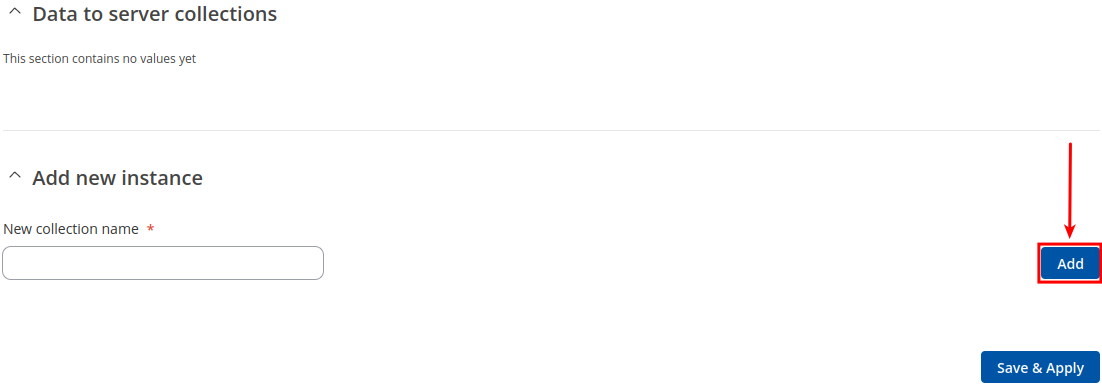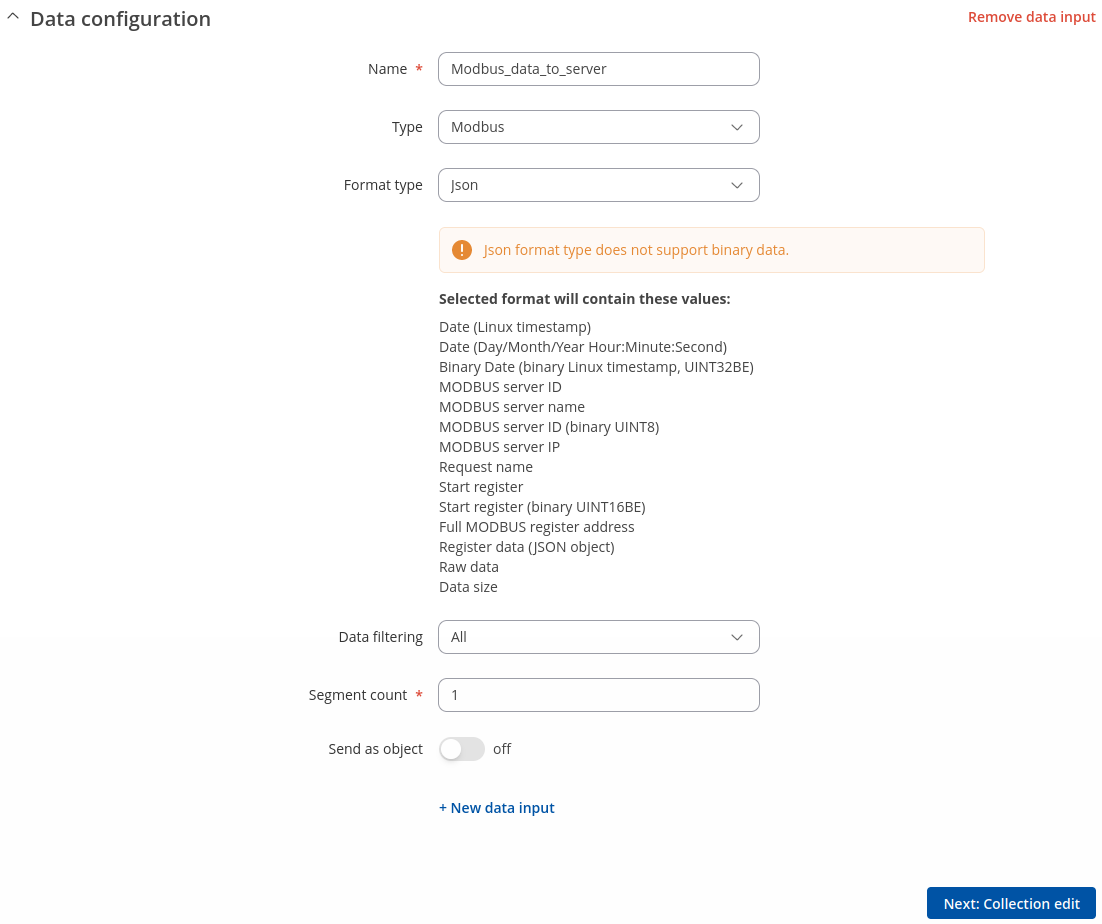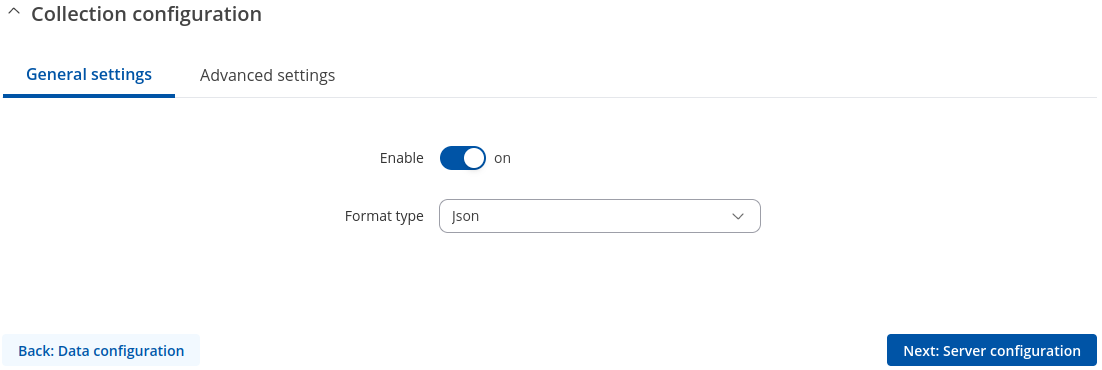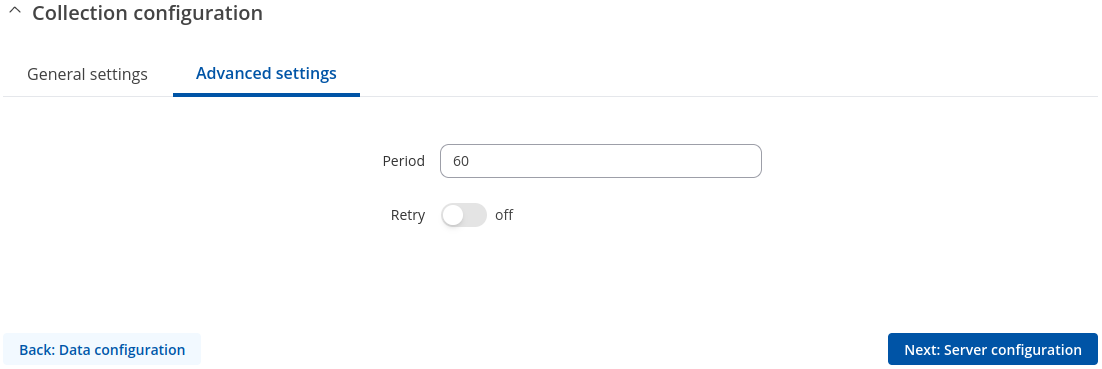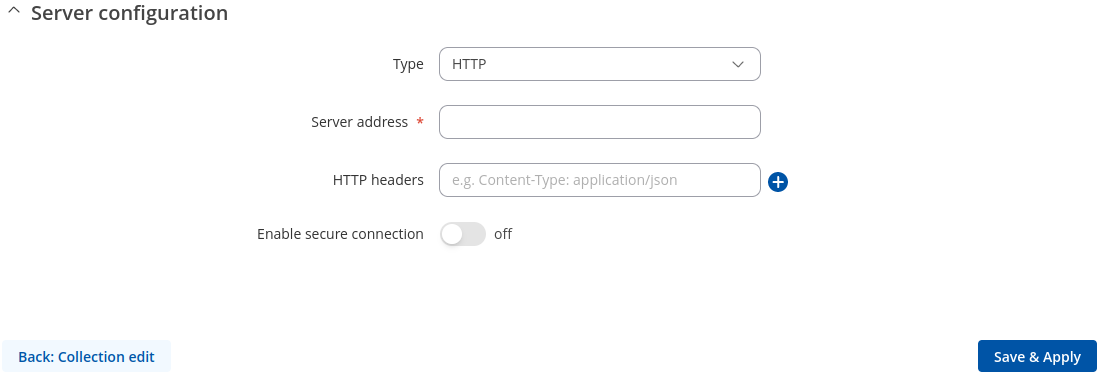RUT230 Data to Server: Difference between revisions
Gytispieze (talk | contribs) Created page with "{{Template: Networking_rutos_manual_data_to_server <!------------------------DEVICE-----------------------> | name = RUT230 | series = RUT2 <!----------------------SEP..." |
No edit summary |
||
| (One intermediate revision by one other user not shown) | |||
| Line 1: | Line 1: | ||
{{Template: | {{Template: Networking_rutos_manual_data_to_server_rut2_rut9 | ||
<!------------------------DEVICE-----------------------> | <!------------------------DEVICE-----------------------> | ||
| name = RUT230 | | name = RUT230 | ||
Latest revision as of 15:20, 8 April 2024
Main Page > EOL Products > RUT230 > RUT230 Manual > RUT230 WebUI > RUT230 Services section > RUT230 Data to ServerThe information in this page is updated in accordance with firmware version RUT2_R_00.07.03.4.
Notice: This device has entered it's EOL (End of Life) cycle. For more information, visit our EOL policy here. Temporarily, some content in this page might not match features found in firmware listed above.
Note: click here for the old style WebUI (FW version RUT2XX_R_00.01.14.7 and earlier) user manual page.
Summary
The Data to Server feature provides you with the possibility to set up data senders that collect data from various sources and periodically send it to remote servers.
If you're having trouble finding this page or some of the parameters described here on your device's WebUI, you should turn on "Advanced WebUI" mode. You can do that by clicking the "Advanced" button, located at the top of the WebUI.
Data Senders
A Data Sender is an instance that gathers and periodically sends collected data to a specified server. The Data Senders list is empty by default so, in order to begin configuration you must add a new data sender first. To add a new data sender, click the 'Add' button.
After this you should be redirected to the newly added data sender's configuration page.
Sender Settings
Refer to the table below for descriptions on data sender configuration fields.
Note: these tables have coloring schemes to indicate which fields can be seen with different configuration.
General
| Field | Value | Description |
|---|---|---|
| Name | string; default: none | Name of the data sender. Used for easier data senders management purposes only (optional). |
| Type | Base | MNF info | Modbus* | Modbus Alarms | Wifi scanner* |DNP3* | MQTT; default: Base | Source of the data to be sent to server. |
| JSON format | Json | Custom; default: Json | Arranges the format of the sent JSON segment. |
| Segment count | integer [1..10]; default: 1 | Max segment count in one JSON string sent to server. |
| Send as object | off | on; default: off | When turned on, sends JSON segment as object and not as an array element. |
| Data filtering | All | Server ID | Alarm ID | Register number; default: All | If Data type: Modbus alarms data. Choose which data this sender will send to server. |
| Data filtering | All | Server IP address | Server ID | Request name ; default: All | If Data type: Modbus data. Choose which data this sender will send to server. |
| Data filtering | All | Name | MAC address | Signal strength; default: All | If Data type: Wifi scanner. Choose which data this sender will send to server. |
| Data filtering | All | Address | IP; default: All | If Data type: DNP3. Choose which data this sender will send to server. |
| Database | RAM | Flash; default: RAM | Database location |
| Port | integer [0..65535]; default: 1883 | Port number for connecting to MQTT. |
| Keepalive | integer [1..640]; default: 60 | MQTT Keepalive period in seconds. |
| Topic | string; default: none | MQTT topic to be used for publishing the data. |
| Client ID | string; default: none | Client ID to send with the data. If empty, a random client ID will be generated |
| QoS | integer [0..2]; default: 0 | MQTT Quality of Service. Allowed values:
|
| Enable secure connection | off | on; default: off | Enables the use of TLS certificates. |
| On: TLS type | Certificate based | Pre-shared key based; default: Certificate based | Select type of TLS. |
| Certificate based: CA File | .ca file; default: none | Certificate authority is an entity that issues digital certificates. A digital certificate certifies the ownership of a public key by the named subject of the certificate. |
| Certificate based: Client Certificate | .crt file; default: none | Certificate file is a type of digital certificate that is used by client systems to make authenticated requests to a remote server. If client certificate is not needed, leave both client certificate and client key fields empty. |
| Certificate based: Private Key | .key file; default: none | File containing private key for this client. This file needs to be not encrypted. |
| Pre-shared key based: Pre-Shared-Key | string; default: none | The pre-shared-key in hex format with no leading "0x". |
| Pre-shared key based: Identity | string; default: none | The identity of this client. May be used as the username depending on the server settings. |
| Require password | off | on; default: off | Enables use of username and password for authentication. |
| On: Username | string; default: none | Username used in authentication. |
| On: Password | string; default: none | Password used in authentication. |
* This is additional software that can be installed from the System → Package Manager page.
Collection general settings
| Field | Value | Description |
|---|---|---|
| Enabled | off | on; default: on | Enables data to server collection instance. |
| Format type | Json | custom; default: Json | Data collection objects formatting. |
| Format string | Default: Instance name | Specifies custom format string |
| Empty value | Default: N/A | A string which will be placed if any value cannot be received |
Collection advanced settings
| Field | Value | Description |
|---|---|---|
| Period | Default: 60 | Interval in seconds for collecting/sending data to destination. |
| Retry | off | on; default: off | In case of a failed attempt, retry to send the same data to destination later. |
| Retry count | Default: 10 | Retry to send the same data N times |
| Timeout | Default: 1 | Timeout in second between retry attempts |
Server configuration
| Field | Value | Description |
|---|---|---|
| Type | HTTP | MQTT; default: HTTP | Interval in seconds for collecting/sending data to destination. |
| Server address | Default: empty | Hostname or IP address of the broker to connect to. |
| HTTP headers | Default: empty | Allows to add custom headers to the HTTP requests. |
| Enable secure connection | on | off; default: off | Enables the use of TLS certificates. |
| Port | integer [0..65535]; default: 1883 | Port number for connecting to MQTT. |
| Keepalive | integer [1..640]; default: 60 | MQTT Keepalive period in seconds. |
| Topic | string; default: none | MQTT topic to be used for publishing the data. |
| Client ID | string; default: none | Client ID to send with the data. If empty, a random client ID will be generated |
| QoS | integer [0..2]; default: 0 | MQTT Quality of Service. Allowed values:
|
| Enable secure connection | off | on; default: off | Enables the use of TLS certificates. |
| On: TLS type | Certificate based | Pre-shared key based; default: Certificate based | Select type of TLS. |
| Certificate based: CA File | .ca file; default: none | Certificate authority is an entity that issues digital certificates. A digital certificate certifies the ownership of a public key by the named subject of the certificate. |
| Certificate based: Client Certificate | .crt file; default: none | Certificate file is a type of digital certificate that is used by client systems to make authenticated requests to a remote server. If client certificate is not needed, leave both client certificate and client key fields empty. |
| Certificate based: Private Key | .key file; default: none | File containing private key for this client. This file needs to be not encrypted. |
| Pre-shared key based: Pre-Shared-Key | string; default: none | The pre-shared-key in hex format with no leading "0x". |
| Pre-shared key based: Identity | string; default: none | The identity of this client. May be used as the username depending on the server settings. |
| Use credentials | off | on; default: off | Enables use of username and password for authentication. |
| On: Username | string; default: none | Username used in authentication. |
| On: Password | string; default: none | Password used in authentication. |


